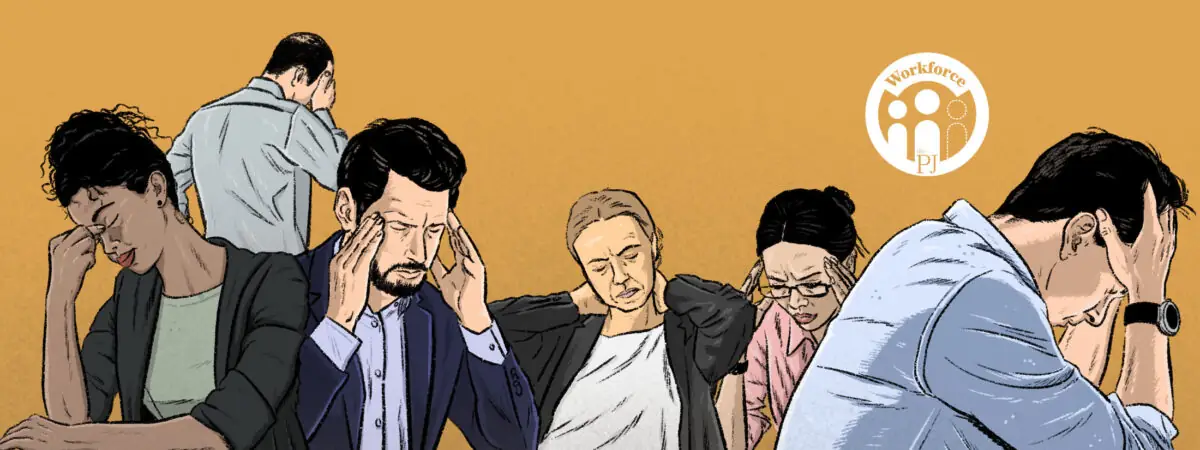Mental illness has long been a significant cause of sickness absence among NHS hospital staff.
NHS data for England, published in March 2025, show that in November 2024, more than one-quarter (26.6%) of all full-time equivalent (FTE) days that were lost owing to sickness were related to anxiety, stress, depression or other psychiatric illness. This was the most reported reason for sickness that month, which accounted for over 630,300 FTE days lost.
This trend has occurred since at least 2019, according to the data available, with mental ill-health routinely the most common reason reported for sickness absence (see Figure 1).
The picture is different for the wider UK workforce, where the most recent data, published in April 2023 by the Office for National Statistics, show that minor illnesses are the most common reason for missing work owing to illness. In addition, mental ill-health was the fourth most common reason. A research paper, written by public health experts at St Mary’s Hospital in London and published in the Journal of the Royal Society of Medicine in 2024, noted that this variance “likely relates to working conditions in the NHS, with over one-third of staff surveyed in the 2022 NHS staff survey in England reporting they often or always felt burnt out because of their work”.
The latest NHS staff survey, published in March 2025, showed that 42% of respondents had felt unwell as a result of work-related stress in the previous 12 months.
Mental health in pharmacy
Pharmacists are among those staff reporting significant mental health concerns. The Royal Pharmaceutical Society’s (RPS) ‘Workforce and Wellbeing Survey 2024’, published in February 2025, revealed that of the 6,598 pharmacy professionals surveyed, more than one-third of hospital pharmacists (36%) reported their mental health as “poor” or “very poor”. Almost nine out of ten respondents (88%) felt they were at risk of burnout, with a similar proportion being reported consistently since 2020.
Additionally, The Pharmaceutical Journal’s 2024 salary and job satisfaction survey revealed that, of the 397 hospital pharmacists surveyed, almost two-thirds of respondents (64%) said they felt “stressed” or “very stressed”, while 8% of respondents said they had taken time off of work owing to stress in the past year — an increase from 4% in 2021.
An investigation conducted by The Pharmaceutical Journal shows that these persistent levels of stress in hospital pharmacy are translating into a rapidly growing number of sick days related to mental ill-health in the sector.
Responses from 102 NHS hospital trusts in England to a freedom of information request show that the number of days lost each year owing to anxiety, stress, depression or other psychiatric illnesses among pharmacists increased from 9,650 calendar days to at least 14,638 calendar days between 2019/2020 and 2023/2024 (see Figure 2). Where a trust reported the number of days lost as five or fewer, this was counted conservatively at one day.
This 52% increase in pharmacist sick days reflects a steady increase over a five-year period, with the number of mental health-attributable sick days in 2023/2024 amounting to 14,638, which is higher than the number of such sick days at the height of the COVID-19 pandemic in 2020/2021, when trusts logged 12,752 sick days.
However, Paul Day, director of membership and communities at the Pharmacists’ Defence Association (PDA) and director of the PDA Union, notes that “the largest increase in these figures came during the [COVID-19] pandemic, which is unsurprising because that period was incredibly stressful for NHS workers”.
“We will never forget the experience of those on COVID-19 wards, for example, and subsequent awareness of their stress increased as a result,” he adds.
While the number of mental health sick days are not rising at the same rate that they did in the first year of the COVID-19 pandemic, it is nevertheless clear that there is a continued increase.
It is important to interpret data on sick leave carefully
Danielle Hunt, chief executive of Pharmacist Support
The increase in sick days reported by NHS trusts include absences logged by consultant pharmacists, chief pharmacists and other trained pharmacists, which outstrips the rate of pharmacist workforce growth, according to NHS data.
An analysis of NHS Digital data, published on 27 March 2025, shows that the total number of pharmacists working in NHS trust pharmacy departments has risen by about 14% between December 2020 and December 2024, from 10,706 to 12,228 pharmacists.
Danielle Hunt, chief executive of charity Pharmacist Support, says that the increasing number of sick days related to mental health are “sadly” not surprising, adding that they “echo the challenges we’ve consistently seen across the profession and align with insights from our 2024 Workforce Wellbeing Survey, conducted jointly with the RPS and published in February 2025”.
Around 20% of those who accessed the charity’s counselling support over the past couple of years identified as working in hospital pharmacy, Hunt says, “suggesting a clear demand for mental health support within this group”.
However, she adds that, while the figures were “deeply concerning”, it is “important to interpret data on sick leave carefully”.
“An increase in time off could reflect growing confidence among pharmacists to prioritise their health, not necessarily a worsening problem,” she says.
“In 2024, 18% of survey respondents reported taking time off due to the impact of work on their mental health, while a further 33% said they had wanted to but hadn’t felt able to. So, sick leave alone may not tell the full story.”
A spokesperson for the Guild of Healthcare Pharmacists (GHP) also describes the increase in mental health-related sick days as “concerning”.
However, like Hunt, the spokesperson notes that it could be because “reporting of mental health-related absence specifically is improving, with de-stigmatisation of such reasons for being off”.
We know from frontline experiences that staff are tired, paid relatively less in real terms each year with few exceptions
Spokesperson for the Guild of Healthcare Pharmacists
“We know from frontline experiences that staff are tired, paid relatively less in real terms each year with few exceptions, and are facing mounting clinical caseloads,” they add.
“There is a greater appreciation of prioritising the mental health and wellbeing of staff. However, employers seem surprised when staff do this by reducing hours, resign from jobs or unfortunately have no other choice but to take a leave of absence.”
In February 2025, the GHP launched a campaign calling for pharmacists working in the NHS to have a minimum of 10% of their contracted hours protected for supporting professional activities to avoid them having to continue work beyond their contracted hours unpaid.
“This pressure is unfair and unsustainable, potentially contributing to burnout,” the GHP said at the time.
Harpreet Chana, pharmacist and founder and chief executive of the Mental Wealth Academy, says: “I think stress and burnout has always been a problem in our profession.
“I wouldn’t be surprised if the increase in the number of sickness days is because people feel more able to disclose that their reason for absence is due to their mental health. Certainly, nine years ago, when I needed to take time off for stress and burnout myself, it was such a stigma that I didn’t tell anybody beyond my line manager at the time because I was absolutely terrified about what people would think.
“Post COVID-19, the term ‘burnout’ has become much more prevalent and so I think people feel more able to talk openly and honestly about their mental wellbeing. And this is only a good thing.
“I still think that this figure probably doesn’t accurately reflect exactly how many people are still struggling with their mental wellbeing, however.”
Reasons for burnout
When asked to identify the factors that have negatively impacted their mental health and wellbeing over the past year, respondents to the 2024 RPS and Pharmacist Support Workforce and Wellbeing Survey cited staff shortages as the main stressor, with 70% of respondents highlighting this.
Other stressors included lack of work–life balance (49%), increased financial pressures (47%), lack of protected learning time (47%), lack of colleague or senior support (47%) and long working hours (34%).
In The Pharmaceutical Journal’s 2024 salary and job satisfaction survey, of the 397 hospital pharmacists surveyed, 79% cited demand for services as a source of stress.
In addition, of the total 1,223 respondents, 892 (73%) cited a lack of appropriate staff as a source of stress.
I have also seen many instances of bullying and toxic work environments that causes real trauma and distress for hospital pharmacists
Harpreet Chana, pharmacist and founder and chief executive of the Mental Wealth Academy
Chana says: “I coach many hospital pharmacists, both on a one-to-one and group basis. And, overwhelmingly, their cause of stress and burnout is a lack of adequate staffing and poor leadership. This is why I coach in both leadership and wellbeing, because the two are inextricably linked.
“I have also seen many instances of bullying and toxic work environments that causes real trauma and distress for hospital pharmacists.”
Chana adds that within trusts, “there are a lot of free resources that most people get signposted to, but other than a few generic wellbeing sessions, trusts aren’t really equipping their staff with adequate self-leadership and self-regulation skills to not succumb to stress and burnout”.
“It is also my belief that if there was funding for proper leadership training and coaching, we wouldn’t see as many problems as we have with poor mental wellbeing,” she adds.
Campaigning for more support
Support for pharmacists struggling with mental health issues is coming from a variety of places (see Box). In March 2025, the PDA launched its workforce wellbeing strategy, which it describes as “a transformative initiative designed to enhance the mental health, financial resilience and overall wellbeing of pharmacists across the UK” and will include mental health awareness courses and leadership training.
Box: Accessing help
There are services in place to support hospital pharmacists struggling with their mental health.
NHS Practitioner Health is a free and confidential service, allowing staff to self-refer for support.
A spokesperson for NHS Practitioner Health told The Pharmaceutical Journal: “Any hospital or community pharmacist working in England or Scotland can access Practitioner Health if they face barriers to accessing confidential treatment through mainstream routes.
“We can offer expert and confidential assessments with access to mental health treatment across a range of conditions from stress or depression through to substance misuse issues,” they added.
“We can ensure pharmacists get the treatment they need and are supported to recover and return to safe, effective practice.”
Pharmacist Support also offers free and confidential support for a range of issues, including workplace stress.
Danielle Hunt, chief executive of Pharmacist Support, says that the charity’s free and confidential support includes “a professional counselling service, offering one-to-one mental health support; our Listening Friends peer support service, delivered by trained pharmacist volunteers; financial assistance for those facing difficulty, which can be a contributing factor to poor mental health, and an extensive library of mental health and wellbeing resources, all available online”.
However, Day adds that no matter how much is done to support pharmacists under stress, “the broader goal must be to prevent stress and anxiety being caused”.
A joint workforce wellbeing campaign between the RPS and Pharmacist Support has been ongoing since 2019. Among other things, the joint campaign calls for appropriate rest breaks, protected learning time and for all pharmacy teams to have access to wellbeing services.
Employers must make sure pharmacists feel recognised and supported in accessing mental health services
Elen Jones, acting director for England and director for Wales at the Royal Pharmaceutical Society
“The rising level of mental health sickness absence among hospital pharmacists is deeply concerning,” says Elen Jones, acting director for England and director for Wales at the RPS.
“This is unacceptable and reflects the growing strain on pharmacy teams as they provide vital care in an overstretched NHS.”
Jones adds that “to fully support pharmacists, they need guaranteed rest breaks and a work culture that prioritises wellbeing”.
“Employers must support flexible working, career development and make sure pharmacists feel recognised and supported in accessing mental health services,” she says.
Commenting on the data uncovered by The Pharmaceutical Journal, a spokesperson for NHS England, says: “NHS staff have experienced unprecedented levels of demand on services in recent years, and we are committed to strengthening occupational health services and providing a range of mental health support — including access to coaching, wellbeing resources and the option of flexible working.”
To drive forward actions along these lines, in February 2024, the RPS held a workforce wellbeing roundtable with 12 other organisations, including Community Pharmacy England, the GHP and Pharmacist Support, with the aim to support pharmacists’ wellbeing.
“Following our previous workforce wellbeing roundtable, we’ve seen positive steps forward,” Jones says. “But more must be done and without urgent action, the pressure on pharmacy teams and the NHS will only get worse.”
Chana’s message to those struggling with their mental health and burnout is: “You are not alone: the majority of the profession is feeling, or has felt, a similar way, so you shouldn’t feel like you can’t talk to anyone about what’s going on.
“Problems with mental health don’t mean you’re weak, it means you’ve tried to stay strong for far too long,” she adds. “Don’t suffer in silence.”
For more information on Pharmacist Support’s work and the support it can offer, visit its website, ask a question using its enquiry form, send an email or call 0808 168 2233



